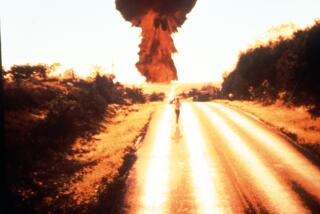Cynicism Infiltrates Grisham’s World
- Share via
John Grisham’s latest novel is both a doubling back on the author’s trail and a venture into bleak new territory. In last year’s “The Testament,” Grisham seemed to be tiring of the legal dramas that had made his name. That story pushed an environmental issue--saving Brazilian wetlands--and had a hero who had given up his law career for God. In “The Brethren,” Grisham returns to the sordid legal world with a vengeance but also with a difference: No longer is any character idealistic enough to challenge it.
This novel, one of Grisham’s leanest, cuts back and forth between two plot lines, which in the end converge. In the first, three former judges--Finn Yarber, once chief justice of the California Supreme Court; Hatlee Beech, once a federal judge in Texas; and Joe Roy Spicer, once a justice of the peace in Mississippi--convicted of crimes ranging from manslaughter to tax evasion don choir robes and hold “court” for fellow inmates’ disputes in a minimum-security federal prison in Florida. Known as “the Brethren,” they pick up extra illegal cash by helping inmates file appeals. The real money, though, comes in more sinister ways.
The Brethren are also placing ads in gay magazines, pretending to be incarcerated young hunks and corresponding with rich, elderly, deeply closeted men. When the latter have sufficiently compromised themselves, the Brethren spring the trap. The profits from their extortion are deposited in Caribbean banks by their lawyer and conduit to the outside, boozy Trevor Carson, who takes a cut.
Meanwhile, in another quarter, Teddy Maynard, who has run the CIA as long as J. Edgar Hoover once ran the FBI, frets that a new strongman about to take power in Russia will revive the Cold War, and he wants the U.S. defense budget doubled, a political impossibility unless he finds an ally and pawn. He recruits malleable Arizona Congressman Aaron Lake and offers him a two-part deal: Run for president, and unlimited campaign funds will be made available to you. Pound hard on the defense issue, and enough terrorist incidents will occur before the election to scare the public and make you look like a prophet.
All goes well. The telegenic, clean-living Lake wins the Republican nomination. But he too has a secret, one even the CIA fails to discover until it’s too late. Maynard’s candidate is trading love notes with “Ricky,” a male inmate in a Florida prison--and the Brethren are threatening to out him.
Next to Maynard’s agents, who are armed with the latest surveillance gear and willing to kill at a moment’s notice, the ex-judges seem harmless, even amusing, old rascals--except that they never rise above a pervasive, dispiriting level of corruption. Deciding whom to root for, in fact, is a problem in “The Brethren.” The only character who isn’t motivated by money is weary, wheelchair-bound Maynard, the subverter of democracy. He thinks he’s “saving the world,” Grisham tells us with no discernible irony.
Well, is he? It hardly seems to matter to Grisham, who has written this book in the same mood with which the hero of “The Testament” viewed his past life. It’s a fallen world without God. Sin is sin, whether it’s Carson’s drinking or Spicer’s theft from bingo games or--and here Grisham plays the Rose Bird card--Yarber’s hippie flakiness and opposition to the death penalty, which got him recalled and led to other troubles. And when Maynard permits the U.S. Embassy in Cairo to be bombed--80 dead--to help swing the election, the cumulative effect is a little wearisome.
This is dangerous territory to enter: A novelist has to love the world--although he may hate many of its features--and has to like his characters enough to make them interesting. When faced with such flat and universal contempt, even fans as devoted as Grisham’s may start to wonder whether this contempt extends to them too.
More to Read
Sign up for our Book Club newsletter
Get the latest news, events and more from the Los Angeles Times Book Club, and help us get L.A. reading and talking.
You may occasionally receive promotional content from the Los Angeles Times.









